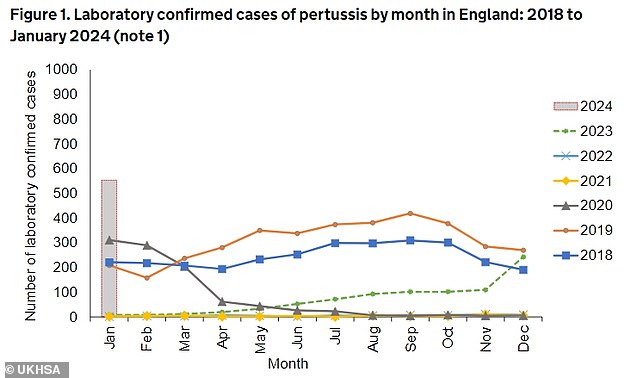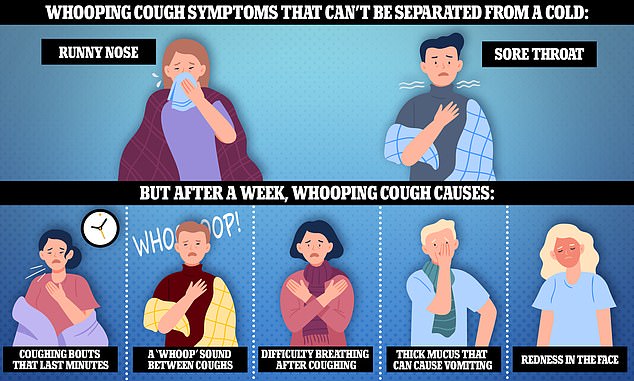
Health officials today begged parents to get their children vaccinated amid spiralling cases of whooping cough.
Experts blame the resurgence of the ‘100-day cough’ on a slump in vaccine uptake among kids and mothers-to-be, as well as a post-Covid resurgence caused by less immunity due to pandemic social distancing.
UK Health Security Agency (UKHSA) bosses received 553 lab-confirmed reports of whooping cough cases in England alone in January.
It marks a 61-fold rise on the nine logged over the same month in 2023 and comes after MailOnline earlier this year revealed that cases of whooping cough were at a decade high.
For comparison, there were 858 cases recorded in total last year.
Your browser does not support iframes.
UK Health Security Agency (UKHSA) bosses received 553 lab-confirmed reports of whooping cough cases in England alone in January. It marks a 61-fold rise on the nine logged over the same month in 2023 and comes after MailOnline earlier this year revealed that cases of whooping cough were at a decade high
Health officials warned the infection is initially difficult to tell apart from a cold, with the first signs typically being a runny nose and sore throat.
But around a week later, sufferers may develop coughing bouts which last minutes, struggle to breathe after coughing and make a ‘whoop’ sound between coughs.
Other signs of pertussis, as it is medically known, include bringing up a thick mucus that can cause vomiting and becoming red in the face.
UKHSA surveillance figures show, of the 553 cases confirmed in January, more than half (287) were among those aged 15 years or older.
Just under a third (29.1 per cent) were in children aged 10 to 14 (161).
Some 22 infants aged under three-months, who are too young to be fully vaccinated, were also diagnosed.
The 6-in-1 vaccine, given to babies at eight, 12 and 16 weeks, and the 4-in-1 pre-school booster, administered to children aged three years and four months, is vital for protecting against catching whooping cough.
Pregnant women are also encouraged to get the vaccine to protect their baby from catching the infection in the first few weeks of their life.
Parents have been urged to check their kids have had both jabs.
Without the jabs, experts warn people risk becoming seriously ill from the infection and passing it on to others.
However, uptake of the 6-in-1 vaccine (92.6 per cent) and 4-in-1 jab (83.3 per cent) both slumped to all-time lows in 2023, according to NHS England data.
Meanwhile, just 61.5 per cent of expectant mothers had the whooping cough jab in 2022 — the smallest number in seven years.
Dr Gayatri Amirthalingam, UKHSA’s consultant epidemiologist at UK Health Security Agency, said: ‘Whooping cough can affect people of all ages but for very young infants, it can be particularly serious.
‘However, vaccinating pregnant women is highly effective in protecting babies from birth until they can receive their own vaccines.
‘Parents can also help protect their children by ensuring they receive their vaccines at the right time or catching up as soon as possible if they have missed any.
‘If you’re unsure, please check your child’s red book or get in touch with your GP surgery.’
Steve Russell, national director for vaccinations and screening at NHS England, added: ‘With whooping cough on the rise, it is important that families come forward to get the protection they need.
‘If you are pregnant and have not been vaccinated yet, or your child is not up-to-date with whooping cough or other routine vaccinations, please contact your GP as soon as possible, and if you or your child have symptoms ask for an urgent GP appointment or get help from NHS 111.’
Whooping cough is caused by the pertussis bacteria and is spread by coughing and sneezing.

Health officials warned that the infection is initially difficult to tell apart from a cold, as the first signs are a runny nose and sore throat. But around a week later, sufferers may develop coughing bouts that last minutes, struggle to breathe after coughing and make a ‘whoop’ sound between coughs. Other signs of whooping cough include bringing up a thick mucus that can cause vomiting and becoming red in the face
Your browser does not support iframes.
Doctors dish out antibiotics as treatment if the whooping cough is detected within three weeks.
However, if a person has been infected for longer, antibiotics will not speed up their recovery.
Pre-pandemic, between 2,500 and 4,500 suspected cases were logged each year. This fell to around 500 during the coronavirus crisis as social distancing curbed the spread of most bugs.
But cases hit 1,728 in 2023 because of the post-pandemic rebound, in a trend that experts say is down to lower societal immunity as a result of the Covid era. Similar trends were seen for bugs like flu and RSV.
However, rates are still nowhere near the annual high of 170,000 logged in the 1940s. Routine vaccination against whooping cough in the 1950s dramatically slashed levels.
Health officials also acknowledged cases of whooping cough rise cyclically every few years. The last peak year — 2016 — logged 5,949 cases.

